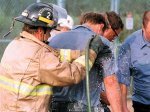Emergency Responsiveness

I learned that it is most likely in a major event; we will all be on our own. This was chilling and eye opening. I had come to think that after Katrina, but had no idea how close we are every day to having our basic public services overwhelmed, such as hospitals, firefighters, police, etc. They were preparing us to survive 72 hours on our own. After I finished just the first day I realized that we must plan for at least 10 days to be on our own. I learned about Triage, or sorting victims, into those that immediately need medical assistance versus those where medical treatment can be delayed, versus the dead. Based upon these facts:
1) In a town of about 13,000 people I was the only participant in the training
2) In a neighboring town of 15,000 only 3 attended
3) Several other towns of similar size had one to two people attend the training
4) Firefighters that work in these towns, don't live in the towns and often, not even the county, and must commute, will most likely not be available during an emergency. The same is true for other services such as police Dept.'s
5) To operate a Fire Engine, you need to be trained extensively on driving the trucks and the knowledge of hydraulics to operate the hoses and connect them to fire hydrants.
These towns won't be prepared for many, many years to handle an emergency, if ever. Take this message very seriously, as your life may depend upon your knowledge of what to do in an emergency, as well as your family members and neighbors. I will post some summaries of what you will need to do over the next months along with the usual political comments. But a good start is to contact your local Fire Department and ask them if there are any classes offered on CERT (Community Emergency Responsiveness Training). I live in a community of 70 homes and am currently organizing them to be prepared and develop contingencies so that we can survive. The only survival will be at neighbor helping neighbor level, not from public services.
0 Comments:
Post a Comment
<< Home